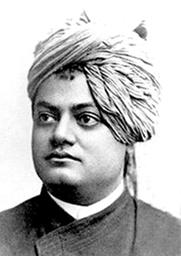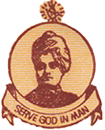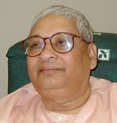Swami Vivekananda (1863-1902)
 Swami Vivekananda was born as Narendra Nath Dutta in a liberal and well-to-do family of Kolkata. As a boy, he used to spend long hours in a meditative pose and later on, had radical & modern thoughts. As a true rationalist he rebelled against the idea of accepting anything of faith. He desired to satisfy himself with reasons and evidences. No preaching or sermons were acceptable to him straightway. He met many religious leaders but none could convince him about the existence of God. He had become restless in search of truth when he came in contact with Sri Ramakrishna. Previously he did not believe that the individual and the supreme are identical but Sri Ramakrishna’s teachings and careful handling made him realize the all pervasiveness of the ‘Spirit.’ Thus at the feet of a simple and almost illiterate Ramakrishna, the most intellectual humbled himself.
Swami Vivekananda was born as Narendra Nath Dutta in a liberal and well-to-do family of Kolkata. As a boy, he used to spend long hours in a meditative pose and later on, had radical & modern thoughts. As a true rationalist he rebelled against the idea of accepting anything of faith. He desired to satisfy himself with reasons and evidences. No preaching or sermons were acceptable to him straightway. He met many religious leaders but none could convince him about the existence of God. He had become restless in search of truth when he came in contact with Sri Ramakrishna. Previously he did not believe that the individual and the supreme are identical but Sri Ramakrishna’s teachings and careful handling made him realize the all pervasiveness of the ‘Spirit.’ Thus at the feet of a simple and almost illiterate Ramakrishna, the most intellectual humbled himself.
Swami Vivekananda became highly famous after his historic speech at the Parliament of Religions at Chicago in America in the year 1893. Through him the western world was enriched with a proper idea about the imperishable wealth of spiritual and cultural treasures of India. It is also truly held that the said Parliament is remembered because of Swami Vivekananda. The reasons of his universal popularity is to be traced to the fact that he tried to raise the dignity of man to the highest level and dedicated himself with great devotion to the service of the suffering humanity. His personality bled at the sight of human suffering. He declared that service to the poor, the illiterate, the ignorant, the afflicted is the highest religion. God is present in every ‘jiva’ and there is no other God besides that. The dignity of man was raised above everything else and he was emphatic on the point that one can find peace and prosperity by serving the suffering humanity more easily than offering tons of fruits and flowers at the holy altar of God. The example he gave was very simple. In our daily life, he said, we find a father is naturally happy when his children are well taken care of. How can the Supreme Father be happy when tons of flowers and fruits are offered to Him in the temple but His children outside are starving or suffering from ailments? His mission was both national and international. Like Bhagiratha, he brought down the stream of spirituality from the height of Ramakrishna’s life for the benefit of the mankind.
As a great lover of humanity, this patriot Saint of Modern India upheld the glory of India’s ancient heritage and stressed upon the need for formulating all national programmes on the basis of spirituality. His “Lectures from Colombo to Almora” was the fountain-head of national inspiration to hundreds of freedom fighters of the country. He lived a short life of thirty nine years of which about a decade was spent in intensive social work including establishment of the great Math in the name of his Master at Belur (Howrah). Yet he left for posterity his four classics – Janna Yoga, Bhakti Yoga, Karma Yoga and Raja Yoga, all of which are outstanding treatises on Hindu philosophy.
It has been said that if Ramakrishna was the thought – Swami Vivekananda was the expression. Both the Master and the disciple revealed the spirit of Hinduism at its best and highest espousing at the same time that philosophy and not mythology and rituals was the very soul of every religion. It is because of mistaken attitude towards religion that different communities could not tolerate each other. The cardinal principle of Ramakrishna Movement is “Atmana mokshartham jagatddhitayachaa (the liberation of the self and the welfare of the world)”. Swami Vivekananda showed how renunciation can go hand in hand with intense activity for the sake of others.
 +91 7439400724
+91 7439400724 rkvmbkp76@gmail.com
rkvmbkp76@gmail.com


